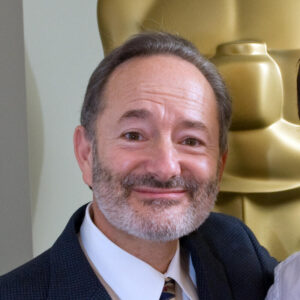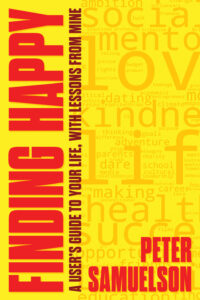
Peter Samuelson has had an eventful life. The “Revenge of the Nerds” producer has worked in the film industry since the 1970s and has founded several nonprofit organizations dedicated to helping children in need.
With his new book “Finding Happy: A User’s Guide to Your Life, with Lessons from Mine,” he hopes to use that wealth of experience to help others struggling with their mental health or finding their place in the world.
Samuelson is the founder of First Star, a nonprofit that teaches classes to high school students in the foster care system, as well as the Starlight Children’s Foundation, which provides resources and entertainment to hospitalized children. Through mentoring hundreds of foster children, Samuelson identified common struggles these children often faced and set out to write a book addressing them using his own experiences. For some chapters, he consulted and co-wrote with some of the same teenagers First Star has helped educate.
We sat down with Samuelson to discover what “finding happy” really means and what he hopes young adults learn from his first book.
Responses have been edited for length and clarity.
Why did you target “Finding Happy” towards a specifically Gen Z and Millennial audience?
That’s who I’m passionate about. I think they are the only future our world has. Everything that is important to us will be in their hands. So, I think we owe it to the future of our planet, our society, our families. We owe it to them to do our best by them, because they’re the only future anything we care about could possibly have. I think of it like ripples on a pond as we lift up our young adults. So, you know, with a wing and a prayer, they’ll lift up their children, who will become young adults, and that is how we build the future of life as we know it. And what could be more important than that?
Did recent events like the loneliness epidemic or the current mental health crisis have an impact on your writing?
Absolutely. Through First Star, I’m very attuned to what bothers young people. Their lives have been made immeasurably worse by the COVID [pandemic], because they had to deal with a lack of socialization and camaraderie. Zoom is all well and good, but there’s no way to learn that’s as good as being in a classroom with your teacher. It’s not a coincidence that so many children have fallen behind in school.
[“Finding Happy”] isn’t political, but I do think we live in a very confusing world regardless of politics. Things our young adults have been told for years are not happening. I’ve really tried to listen to the young adults I’ve mentored, and I pulled in a number of experts to help me get this book right.

How has your experience with charity work informed some of the lessons in this book?
Through my seven nonprofits, I think what I’ve learned is that the meaning of life can be found through service to others, in the short, medium and long term. “Finding happy” in the short term might be sitting on the couch and eating a tub of chocolate ice cream. In the medium term, “finding happy” might be an endless supply of chocolate ice cream. But in the long term, it’s not that at all. I think it comes from helping others.
In one of the classes I teach, the kids had to write an essay about who they would give $200 to. They got very excited about writing them. One of them wrote about saving three puppies at the animal shelter, because one had been very badly beaten and it reminded him of how he had been beaten. Another said they would send the money to their mother who was in jail, because she hated the shampoo they had in prison and they wanted her to be able to get good shampoo.
These kids are not in charge of anything in their lives, but giving them agency over one thing is like watching flowers grow. Foster kids are moved around like cardboard boxes, and it makes them feel disempowered. But if you make them give some money away to someone less fortunate than them, it is a revelation for them.
How do you find the time to “find happy” and work on yourself when the world feels so chaotic?
Between seven charities, my family and my career as a film producer, I don’t sleep that much. Being organized helps, and that’s the subject of one of the book’s chapters. If you are organized, you’re doing yourself an enormous favor. Not only will you get much more done, but you’ll be much less stressed. Don’t do the homework on the bus on the way to school on the last possible day, do the homework the day they give it to you and you’ll do yourself a great favor.
I think this is one of the easier lessons to teach young adults. It gives you more time to do the things you care about, to get more out of your schooling and to be a better human being.
Many teenagers entering young adulthood struggle with their mental health. Do you have any advice for teenagers making that transition?
First, everyone needs unconditional love and someone to talk to. It could be a grandparent, teacher or mentor. You do not have to invent the rules of the road for your life. You have to decide what direction to drive, but there are adults who can help you, and who want to help you and who care about you, and your mental health will be advanced by having someone that you can turn to to ask questions.
It might be better if it’s not your parent, though. Being a teenager, in many cases, is about wanting to do the opposite of what your parents think you should do. But if you’re 16, your best advice is not going to come from another 16-year-old friend. It’s going to come from someone who’s walked the walk and lived through some of the experiences you’re living through.
What’s one thing you hope people take away from reading “Finding Happy?”
You are the author of the rest of your life, so you’re in a position of power to decide what you want the rest of your life to be. You need a destination, but in your younger years, you have the great privilege of being flexible and trying different things. You can change your major [in college] and try different things until you find the right fit.
A major pathway to “finding happy” is to help people who are less fortunate than you. You will meet wonderful people. You might fall in love with one of them. That’s how I met my wife all those years ago. You will meet people who are helpful in your academic life, in your schooling and in your career, and you will find joy. In the end, finding happiness is, in large measure, through helping other people.






